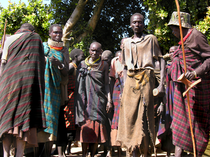Ikland
| Ikland | |
|---|---|
 | |
| Directed by | Cevin Soling David Hilbert |
| Written by | Cevin Soling |
| Produced by | Cevin Soling |
| Cinematography | David Pluth |
| Edited by | Hilbert |
| Music by | Sacha Lucashenko |
Production company | |
Release date |
|
Running time | 88 minutes |
| Country | United States |
| Languages | English, (with translations of Swahili, Karamojong, Dodoth, and Icietot) |
Ikland is a 2011 documentary film about a journey into the mountains of northern Uganda near the Kenyan border and a visit with the notorious Ik people.[1] It was produced by Cevin Soling, and directed by Soling and David Hilbert.[2]
The Ik were famously described as callous and indifferent by anthropologist Colin Turnbull in his 1972 ethnographic book The Mountain People.[3] Ikland recounts an adventure in travel, revisits Turnbull's description in the context of local circumstances, and reveals the Ik people and culture in a more sympathetic and up-to-date manner.[1]
Background

Anthropologist Colin Turnbull previously studied the Ik during the mid-1960s during a period of prolonged drought. His research resulted in his controversial book The Mountain People, published in 1972.[1] Turnbull described the Ik as a people who, as a result of prolonged hardship and destitution, abandoned their children, stole food from their elders, and threw human feces at each other for fun. Turnbull concluded that the Ik people would eventually die out, and suggested that the Ugandan government intervene to forcibly resettle survivors in other parts of the country.[4]
Plot
Episodes of violence and hardship have made travel to the region both hazardous and difficult in the years since Turnbull's departure. On their way north from Kampala, Soling's crew encountered both friendly tribesman and armed militia, eventually reaching the Ik after many experiences.[1][5][6] Soling convinces Ik from a particularly remote village to perform a theatrical adaptation of Charles Dickens' A Christmas Carol, intended as a metaphor for the redemption of their international reputations.[2]
Production
Pre-production
Cevin Soling was first introduced to the Ik during the seventh grade, when his teacher assigned the reading of a Lewis Thomas essay entitled "The Iks." Soling remembered his class reacting with amusement instead of the horror his teacher expected. Classmates found the stories of Ik barbarism absurd and comical, and he never forgot the assignment, saving the photocopied essay into adulthood.[2]
Soling announced that he wanted to film in Uganda during the summer of 2004. Fanny Walker joined the crew as a drama instructor. Production manager Nichole Smaglick approached a National Geographic production in southern Uganda,[2] but could only recruit cinematographer David Pluth,[2] because no one else would risk travel in the north.[citation needed]
Filming

Pluth sustained injuries from an elephant attack in late 2004, which delayed production for several months. Soling flew with Walker from New York to Entebbe in February 2005. There they met Pluth, Smaglick, and assistant director Lawrence Owongo. While traveling north, the team was arrested by the Ugandan Army, who released them only after destroying much of their footage.[2]
The Ik were terrified that the crew might be agents of the Lord's Resistance Army, and stayed away until they realized things were safe. According to Soling, the tribe was unaware of the content of The Mountain People. They did know, however, that a man called Turnbull had spread "malicious lies" about them. It took some time for the villagers to feel comfortable with the crew, but interviews thereafter were undertaken in a loose and conversational manner.[2]
Post-production
Soling approached David Hilbert during the spring of 2009, entrusting him with some 67 hours of original footage for editing. An additional 3 hours shot by Turnbull during the 1960s was provided by the Smithsonian Institution. Hilbert was given complete artistic freedom during post-production, as he assembled the film without a script.[2]
Hilbert presented much of the film as a collage of matted images,[2] creating what one reviewer called a "postcard" effect.[1][6] Original music was composed and performed by Sacha Lucashenko. Sound was edited and mixed by Martin Trum, and opening credits were designed by Neil Stuber.
Reception
The documentary was the Winner of the "Indie Spec Best Content in a Documentary" award at the 2011 Boston International Film Festival,[2] and was positively reviewed by Discover Magazine[1] and Lonely Planet.[6]
References
- ^ a b c d e f Mooney, Chris (June 6, 2011). "Ikland - A New Film By Cevin Soling and David Hilbert". Discover Magazine. Retrieved 2011-07-11.
- ^ a b c d e f g h i j "Ikland Movie Home". Ikland Movie. Retrieved 2011-07-11.
- ^ Turnbull, Colin. "The Mountain People" Johnathan Cape Ltd, London, 1972.
- ^ Turnbull, Colin. "The Mountain People" Johnathan Cape Ltd, London, 1972, pp. 287-295.
- ^ "Ikland". Schrock and Awe. July 1, 2011. Retrieved 2011-07-11.
- ^ a b c Mutic, Anja (May 1, 2011). "Journey the Ikland". Lonely Planet. Retrieved 2011-07-11.
{{cite news}}: Italic or bold markup not allowed in:|publisher=(help)
